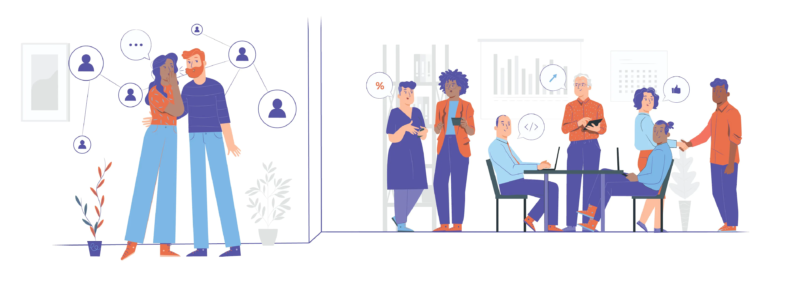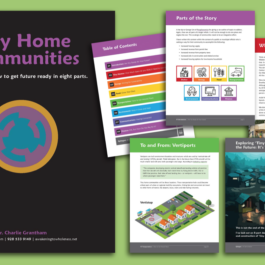What are the top 10 trends for the next ten years? Download the report here.

Image Credit: Stephanie Brown
One day I walked in the front door of our offices with the mobile phone stuck to my ear. I was having a rather pointed conversation about a project, and the frustration I felt during the call must have been evident to observers. So much so that as I walked up the stairs to my office, I could hear our receptionist say clearly into her phone: “He is here, and he doesn’t look like he is in a good mood.”
When I described the encounter to my assistant, she laughed and told me that, clearly, the grapevine was in full force that day! Apparently, the receptionist was the first line of communication with the rest of the staff, and everyone wanted to know my mood so they could adjust their approach to me throughout the day!
I wasn’t aware that I was projecting my attitude as I walked in the building or that my moods were interesting to anyone!
Lesson Learned
From then on, I took it upon myself to always stop and have a conversation with the receptionist when I came into the building, even to the point of occasionally mentioning a challenging project the Chamber was involved in. For the next 37 years, my communication with the support staff became crucial in dealing with organization-wide challenges. Then, in mid-March 2020, I concluded that my body language didn’t matter much anymore. Remote work and the now ubiquitous access to video meeting software changed the game of communications. Stopping to speak with our front-line support staff wasn’t possible with all of us working from our homes. Or was it?
The Day the World Changed
I realized that putting a smile on my face when I entered the building every day wasn’t magical. Instead, it was the fact that I took the time to speak to everyone as often as I could and that I was willing to speak about what was on my mind and listen to each person about what was on theirs.
So, I began to write emails every morning to the staff. Every day for weeks and weeks, I wrote about what my family and I were doing. I wrote about the Chamber and what was happening. I wrote about the frustrations we were all feeling, even the fear we were all experiencing. I was as candid as I could be about what we expected from everyone. I reiterated our values over and over and guaranteed that we would make decisions based on those values. And the staff responded.

Image Source: Donna Ashworth
Did it Matter?
I was getting several responses each day…not always from the same people. Depending on the message I had written, my team responded with examples of their own lives, challenges, and fears. Most were sent only to me. But every now and then, someone would “copy all,” and the entire staff could share what was going on in their life.
E-mail messages have always been an impersonal and often misused means of communicating important information. But during this remote work experience, I concluded that it wasn’t the form of communication that mattered, but rather the message being delivered.
That lesson is still valid today. Sincerity, openness, and empathy are essential attributes of effective communication. And I found a way to use email to demonstrate these attributes. And by responding to any raised questions or concerns, I also showed how critical listening is in the communication process.
It Made a Difference
After we were all back in the office, I received a wonderful email one day from one of our long-time staff. She told me that my daily emails had sustained her through many difficult days during the pandemic. She had missed her co-workers terribly and was very happy to be back, where we could interact with everybody every day. But she missed my daily emails because she saw them as a tangible expression of my care and concern for every one of our work family.
What about you? What constructive lessons have you learned during the past few years that made you a better leader, manager, or employer?
If you feel like sharing, send me an email! I would be happy to hear from you!
If you enjoyed this post, please subscribe to our newsletter.

David G. Brown
This guy. David G. Brown led the Greater Omaha Chamber for two decades, was the driving force behind ACCE’s Horizon effort, and hired our team for Greater Omaha 2040 - which has become a North Star impacting everything from Omaha’s riverfront development to a new downtown and streetcar plan. David has now flipped from being a client to a team member! As a Lead Consultant, he providing guidance, foresight, and insight to clients committed to more ambitious, equitable, and prosperous futures. Watch David's Q&A on how NGC helps organizations prepare for the future using Strategic Foresight. Book a meeting with David and be sure to ask him about bourbon, cigars, the Huskers…or Opera.
Yasemin Arikan Promoted to Director of Futures Research
NEXT Generation Consulting (NGC) announced the promotion of Yasemin Arikan to Director of Futures Research. Arikan will lead the company’s efforts to...
Is Your Housing Market Ready for Your Future?
One of the biggest problems facing many cities and towns is inadequate housing. This problem is most acute for seniors, veterans with disabilities, and low-income groups ...
Three Things Martha Stewart Gets Right About Return to Office (RTO)
The original influencer and the person who invented the "Home" retail category, Martha Stewart, became the latest CEO to tell employees to get back to the office five day...










